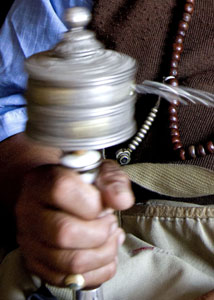Name: Kunchok Tashi
(Alias: Yes)
Gender: Male
Interview Age: 75
Date of Birth: 1937
Birthplace: Utsang, Tibet
Year Left Tibet: 1959
Profession: Farming
Monk/Nun: No
Political Prisoner: No

Interview No.: 13D
Date: 2012-05-21
Language: Tibetan
Location: Mcleod Ganj, Dharamsala, Himachal Pradesh, India
Categories: Culture and History
Keywords: army -- Tibetan, Buddhist beliefs, childhood memories, Chinese army -- invasion by , Dalai Lama, escape experiences, herding, pilgrimage, refugee in India -- life as, refugee in Nepal -- life as, taxes, Utsang
Summary:
Kunchok Tashi used to herd sheep along with his grandfather, who chanted prayers and made Tibetan boots while they grazed the animals. His family owned around 150-160 sheep and his grandfather knew the names of each one. Kunchok Tashi gives a detailed insight into the life of a herder--how they spent their time and how the sheep were named and identified. The herders also spun wool while walking with the sheep that was used to make the nomads' tents.
Kunchok Tashi also talks about the kinds of dogs the shepherds owned: the ferocious dhoyi that was tied near the gate of the home and the zikhyi that accompanied the shepherd and helped keep away predators like wolves. He describes the wurdho 'slingshot' that a shepherd used to chase away wolves and how the zikhyi were trained to follow commands.
Kunchok Tashi and his father decided to escape from their village once they received news about the imminent arrest of his father by the Chinese. They had no time to make plans or take anything with them. When they reached Nepal, they worked as coolies for four years and then reached India in 1963, where Kunchok Tashi continued to work as a coolie on construction projects.
Interview Team:
- Rebecca Novick (Interviewer)
- Ronny Novick (Videographer)
- Thupten Kelsang Dakpa (Interpreter)

